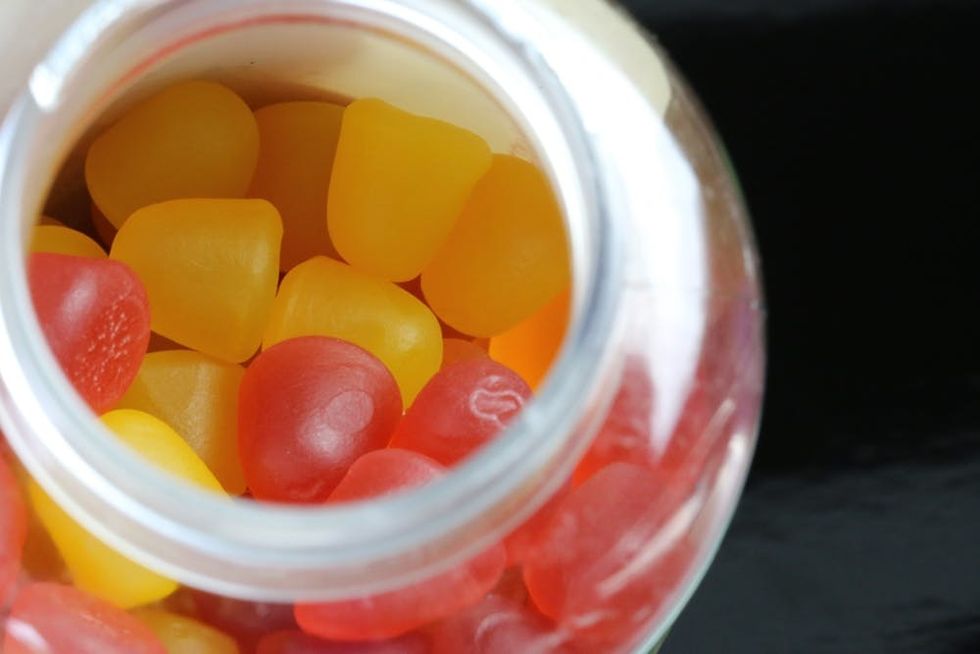They might taste like candy, but don’t be fooled.
Yes, You Can Totally Overdose on Gummy Vitamins

As a kid, you might have munched on Flintstone vitamins or some other chalky, fruit-flavored version of a multivitamin. Fast forward to today, and gummy vitamins of all sorts are being hawked to adults. They might look and taste like fruity candy, but eating too many can have some negative side effects, including overdosing on certain vitamins.
“Vitamins should be treated more as a medicine than a candy,” says Melissa Majumdar, MS, RD, senior bariatric dietician at Brigham and Women’s Hospital in Boston and spokesperson for the Academy of Nutrition and Dietetics. “You should refer to the dosing on the bottle or what is directed from your healthcare professional.”

That’s because too much of certain vitamins can really do some damage in your body. “Fat-soluble vitamins such as A, D, and E are stored in fat cells and, if taken in excess, can be problematic,” says Majumdar. Here’s a rundown of some vitamins and minerals you can overdose on and what their potential side effects are:
- Vitamin A: “Excess vitamin A can lead to increased intracranial pressure (pseudotumor cerebri), dizziness, nausea, headaches, skin irritation, pain in joints and bones, coma, and even death,” Majumdar says. “And in pregnant women, birth defects.”
- Vitamin D: “Too much vitamin D can lead to weight loss, polyuria, and heart arrhythmias. More seriously, it can also raise blood levels of calcium which leads to vascular and tissue calcification, with subsequent damage to the heart, blood vessels, and kidneys,” she cautions.
- Vitamin E: “Vitamin E in high doses can cause hemorrhage from interrupting blood clotting,” says Majumdar.
- Vitamin B: Majumdar notes that “the B vitamins can leave a bad aftertaste and even lead to nausea and vomiting.”
- Iron: “Excess iron can cause gastric upset, constipation, nausea, abdominal pain, vomiting, and faintness,” she says.
A few other things to consider when taking gummy vitamins:
1. The sugar content can be pretty high. There’s a reason they taste so good, and the reason is sugar. “Generally, a regular dose of gummy vitamins has four to five grams of sugar, about the amount in one teaspoon of sugar,” says Majumdar. “You’d probably think twice about adding an extra teaspoon of sugar to your coffee, so shouldn’t vitamins be the same?”
2. Sugar-free ones may upset your stomach. “‘Gummy tummy’ is a risk of taking too many gummy vitamins, which can be attributed to the sugar substitute in [some] gummy vitamins,” says Majumdar. Sugar alcohols like xylitol, sorbitol, and mannitol can all cause diarrhea.
3. They can cause vitamin deficiencies. Vitamins and minerals need to be taken in a balanced amount because an excess of one nutrient can also cause a deficiency of another. “For example, some gummies contain zinc and not copper (some contain neither) or zinc and not iron; too much zinc can interfere with iron and copper absorption. When taking any zinc supplement, copper should be taken alongside in a ratio of one milligram copper for every 8-15 mg zinc,” says Majumdar.
4. They may not contain enough vitamins and minerals. Gummy vitamins are not appropriate for everyone. As Majumdar points out, “Gummy vitamins are rarely complete vitamins and lack iron, copper, zinc, vitamin B1, and selenium, and can be low in vitamin A.” So talk with your doctor about your specific vitamin and mineral needs to find the best multivitamin for you.
Do you take gummy vitamins? Let us know your thoughts @BritandCo.
(Photo via Getty)



















